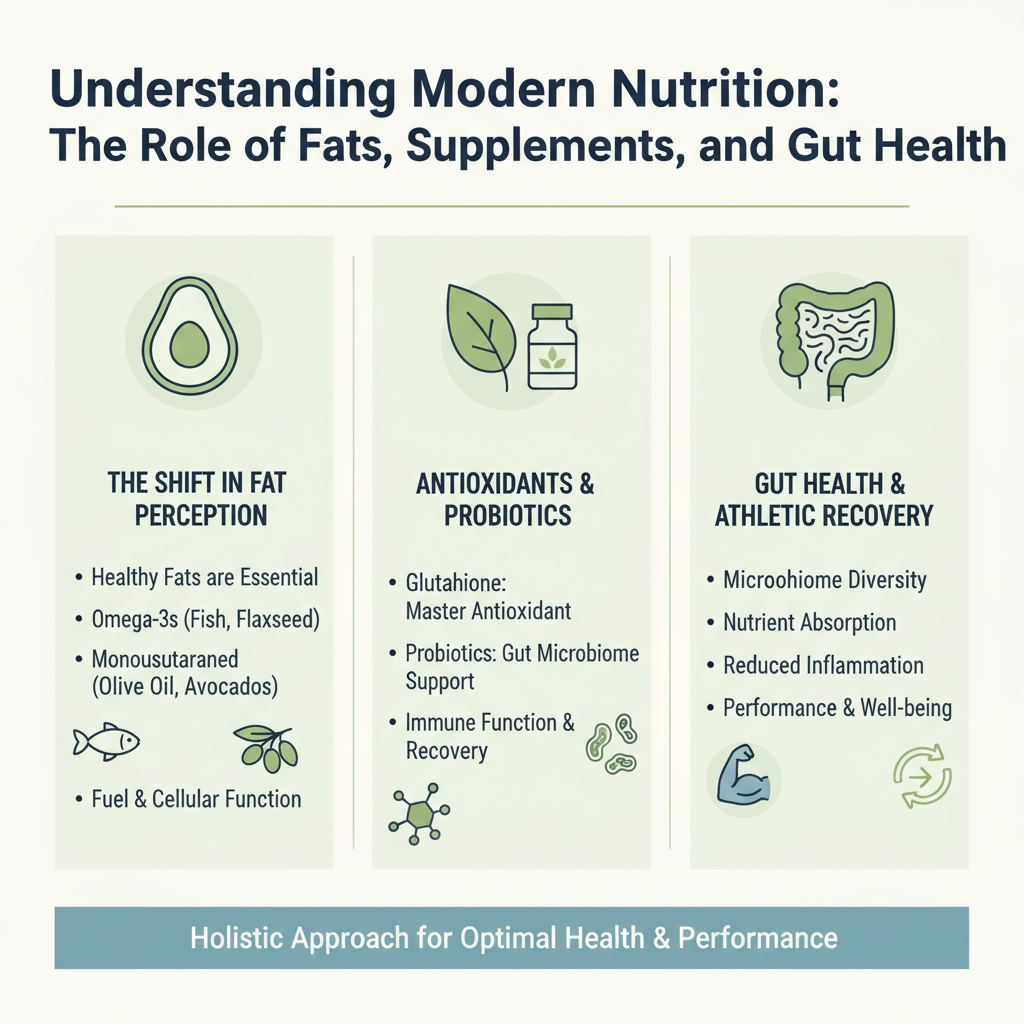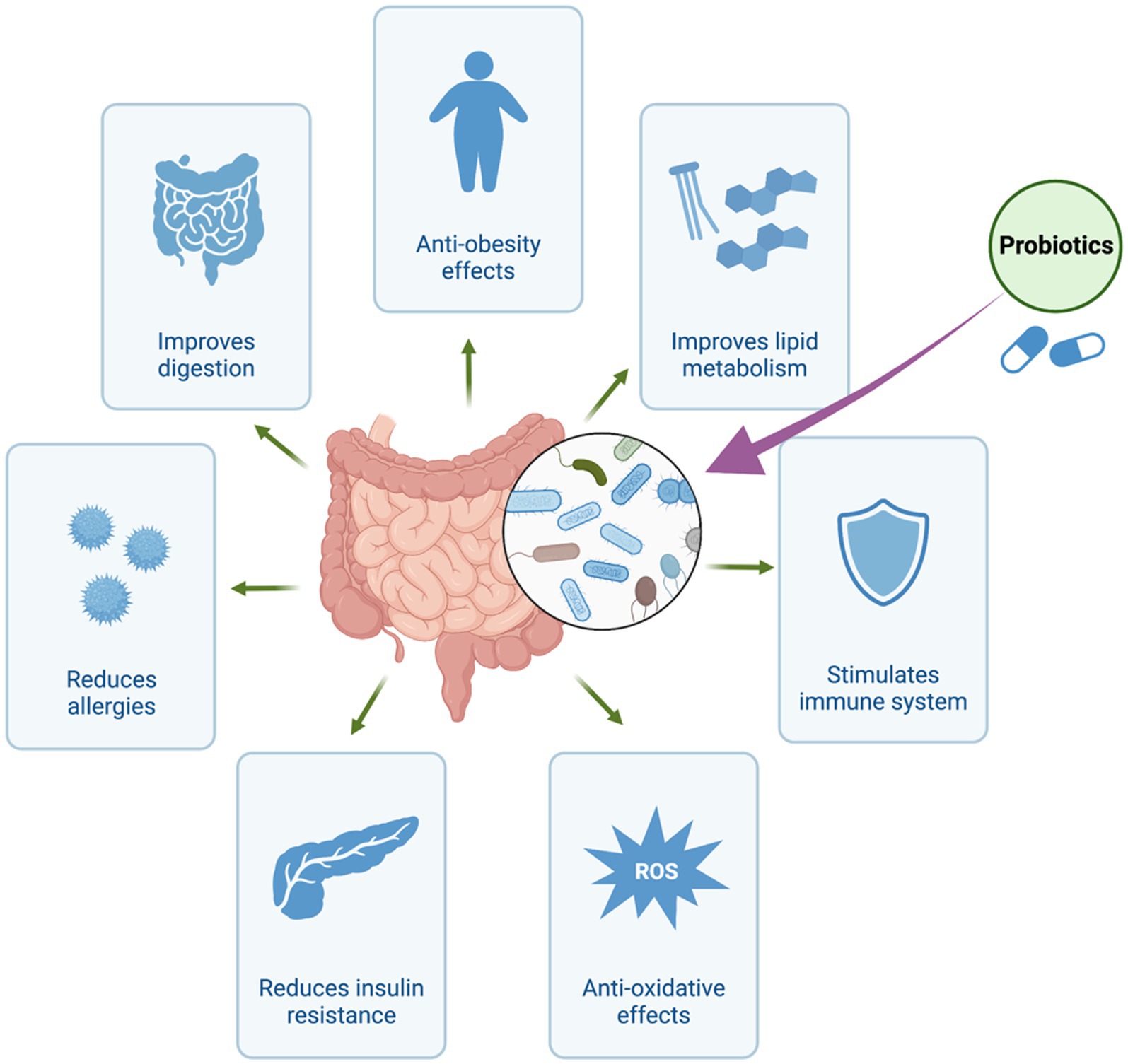
Modern Nutrition Insights: Fats, Supplements, and Gut Health for Optimal Performance
Recent advances in nutrition have reshaped our understanding of fats, supplements, and gut health, highlighting their vital roles in overall well-being and athletic performance. Dietary fats, once feared, are now recognized for their diverse effects, with healthy fats supporting brain health and metabolism through genetic influence. Supplements like glutathione aid in detoxification and muscle recovery, while probiotics promote gut balance, immunity, and even cognitive function. Central to health is the gut microbiome, whose diversity enhances nutrient absorption, reduces inflammation, and boosts athletic endurance. Emerging technologies enable personalized nutrition by analyzing individual gut flora. Integrating these insights fosters better health outcomes, disease prevention, and enhanced performance, aligning scientific knowledge with personal dietary choices.
Summary
Understanding Modern Nutrition: The Role of Fats, Supplements, and Gut Health
In recent years, our understanding of nutrition has evolved significantly, challenging long-held beliefs about diet and health. This article delves into the emerging perspectives on fats, the impact of supplements like glutathione and probiotics, and the critical role of gut health in overall well-being and athletic performance.
Key Takeaways: - The perception of dietary fats is shifting, recognizing their importance in health and disease prevention. - Supplements such as glutathione and probiotics are becoming integral for enhancing health and athletic performance. - Gut health is increasingly seen as foundational for overall health, influencing everything from immunity to recovery in athletes.
Emerging New Perspectives on Nutrition and Fat
The Shift in Fat Perception
Once demonized, dietary fats are now understood to play a crucial role in various bodily functions. Recent research emphasizes the distinction between types of fats. Saturated fats, found in animal products and some plant oils, are no longer seen as universally harmful. Instead, the focus is on the quality and context of fat consumption. Unsaturated fats, particularly omega-3 fatty acids from fish, flaxseeds, and walnuts, are celebrated for their anti-inflammatory properties and benefits for brain health.
Genetic Influence of Fats
Fascinatingly, dietary fats can influence gene expression, particularly genes involved in metabolism. This genetic modulation can affect how our bodies store fat, manage insulin, and respond to dietary changes, highlighting the personalized nature of nutrition.
Health Implications of Fat Consumption
Understanding the nuanced roles of different fats could revolutionize dietary guidelines. A diet that includes healthy fats might reduce the risk of metabolic syndrome, obesity, and related chronic diseases. This shift encourages a balanced approach to fat intake, promoting foods rich in beneficial fats while reducing trans fats and excessive saturated fats.
How Supplements Like Glutathione and Probiotics Contribute to Health and Performance
The Role of Glutathione
Glutathione, a powerful antioxidant, is pivotal in detoxifying the body, reducing oxidative stress, and aiding muscle recovery. For athletes, this means quicker recovery times and potentially enhanced performance. Its supplementation can be particularly beneficial in scenarios of high oxidative stress, like intense training or environmental exposure to pollutants.
Enhancing Athletic Performance
Glutathione's role in reducing inflammation and supporting cellular repair makes it a valuable supplement for athletes looking to optimize their recovery and performance. It helps in maintaining the integrity of muscle tissues, which is crucial for consistent training and competition.
Probiotics and Systemic Health
Probiotics, by restoring and maintaining a healthy gut flora, extend their benefits beyond digestion. They influence the immune system, reducing inflammation throughout the body, which can lower the risk of chronic diseases. Moreover, there's emerging evidence suggesting probiotics can positively affect mood and cognitive function through the gut-brain axis.
Probiotics in Athletic Recovery
For athletes, probiotics can mean faster recovery from gastrointestinal distress often experienced during endurance events. They also enhance nutrient absorption, ensuring that the body efficiently utilizes the nutrients from food, which is vital for energy and muscle repair.
The Importance of Gut Health in Overall Well-being and Athletic Recovery
Gut Health and Nutrient Absorption
The gut is not just a digestive organ but a complex ecosystem influencing overall health. A diverse gut microbiome, supported by a diet rich in plant-based foods, enhances digestion and nutrient absorption. This diversity is linked to better health outcomes, as it supports a robust immune response and efficient metabolic processes.
Impact on Athletic Performance
For athletes, a healthy gut means better energy utilization from food, which is crucial for endurance, strength, and recovery. A compromised gut can lead to issues like 'leaky gut', where toxins can enter the bloodstream, potentially leading to inflammation and reduced performance.
Gut Health and Inflammation
The gut microbiome produces short-chain fatty acids, which are crucial in regulating inflammation. Chronic inflammation, often originating from an imbalanced gut, is a risk factor for numerous diseases. By managing gut health, individuals can mitigate this risk, leading to better health outcomes and longevity.
Technological Advances in Gut Health
Advancements in technology, such as microbiome sequencing, are allowing for personalized dietary recommendations based on individual gut flora profiles. This personalization can optimize health by tailoring diets to enhance beneficial bacteria and reduce harmful ones, potentially revolutionizing how we approach nutrition.
Conclusion
The evolving understanding of nutrition, particularly the roles of fats, supplements like glutathione and probiotics, and gut health, offers new pathways to enhance health, prevent disease, and improve athletic performance. As research continues to unfold, integrating these insights into daily life could lead to significant public health improvements. Embracing these modern nutritional paradigms ensures not just survival, but thriving in health and performance, respecting the principle of food freedom where personal choice aligns with scientific understanding.

Frequently Asked Questions
Q: what is real food freedom
A: Real food freedom refers to the ability to make conscious, informed choices about what you eat without feeling restricted by diets, societal pressures, or food rules. It emphasizes a balanced relationship with food that prioritizes nourishment, enjoyment, and personal values rather than guilt or external control. Achieving real food freedom often involves understanding nutrition, listening to your body's needs, and cultivating a positive mindset toward eating.
Q: benefits of glutathione supplements
A: Glutathione supplements are known for their antioxidant properties, helping to protect cells from oxidative damage caused by free radicals. They may support immune system function, improve skin health by reducing pigmentation and signs of aging, and aid in detoxification processes within the liver. Additionally, some studies suggest that glutathione can enhance energy production and overall cellular health. However, effectiveness can vary based on the supplement form and individual absorption.
Q: how probiotics improve athletic performance
A: Probiotics can improve athletic performance by enhancing gut health, which supports better digestion and nutrient absorption. They also help reduce inflammation and improve immune function, allowing athletes to recover faster and train more effectively. Additionally, probiotics may help decrease the incidence of gastrointestinal issues during exercise, leading to more consistent performance.
Q: Dr. Joseph Mercola health advice
A: Dr. Joseph Mercola is an osteopathic physician known for promoting alternative health approaches, including natural remedies, nutrition, and lifestyle changes. His advice often emphasizes organic foods, supplementation, and reducing environmental toxins to improve wellness. However, some of his views, particularly on vaccines and conventional medicine, have been controversial and criticized by mainstream medical experts. It's important to critically evaluate his recommendations and consult healthcare professionals when considering health decisions.
Q: natural ways to reduce inflammation
A: Natural ways to reduce inflammation include adopting an anti-inflammatory diet rich in fruits, vegetables, nuts, and fatty fish high in omega-3 fatty acids. Regular physical activity, adequate sleep, and stress management techniques like meditation can also help lower inflammation. Additionally, avoiding processed foods, excess sugar, and smoking supports the body's natural inflammatory balance.
Key Entities
Dr. Joseph Mercola: Dr. Joseph Mercola is an American osteopathic physician known for his controversial views on health and alternative medicine. He operates Mercola.com, where he promotes natural health products and critiques mainstream medical practices.
Mercola.com: Mercola.com is a website founded by Dr. Joseph Mercola that offers information on health, nutrition, and alternative medicine. It has been criticized for spreading misinformation about vaccines and medical treatments.
Food and Drug Administration: The Food and Drug Administration (FDA) is a U.S. federal agency responsible for regulating food, drugs, and medical devices to ensure safety and efficacy. It frequently challenges misinformation and unauthorized health claims made by individuals and organizations.
External articles
- The Truth Behind Weight & Health
- From Food Fear to Food Freedom: A Healing Journey with ...
- Food Freedom Made Simple
Related Articles
YouTube Video
Title: 3 Supplements You Should NEVER take | Dr. Janine
Channel: Dr. Janine Bowring, ND
URL: https://www.youtube.com/watch?v=_80azPcnmPQ
Published: 2 years ago
Health